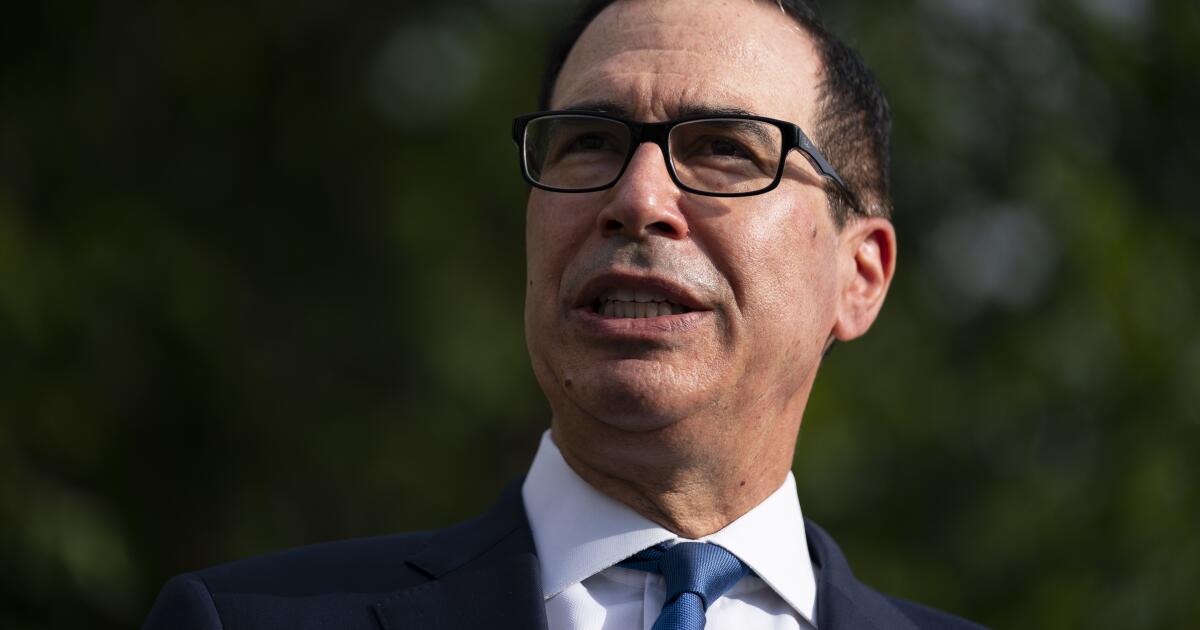Business
Former Treasury Secretary Steven Mnuchin is assembling an investor group to buy TikTok

As Congress weighs a bill that would lead to a nationwide ban of the popular video app TikTok, former Treasury Secretary Steven T. Mnuchin said Thursday he is assembling an investor group that will try to purchase the China-based company.
“This should be owned by U.S. businesses,” Mnuchin said in a television interview Thursday morning. “There’s no way that the Chinese would ever let a U.S. company own something like this in China.”
Mnuchin, who has worked as an investment banker and Hollywood film producer and has long-standing ties to Los Angeles, said he had spoken to a “bunch of people” about forming a group to buy the app that is used by roughly 150 million Americans.
“It would be a combination of investors, so there would be no one investor that controls this,” he told CNBC’s “Squawk Box.” “The issue is all about the technology. This needs to be controlled by U.S. businesses.”
The Chinese government has previously said it would oppose any sale of TikTok. In 2020, leaders in Beijing tightened export control rules to necessitate government approval for any sale of TikTok to a U.S. owner.
With concern growing among U.S. leaders about TikTok’s effect on national security — and influence on millions of young people — the U.S. House passed a bipartisan bill Wednesday that would lead to a nationwide ban if owner ByteDance Ltd. does not sell its stake. President Biden has pledged to sign the bill, which passed in the House by a vote of 352-65 with 50 Democrats and 15 Republicans casting a vote against.
But its fate is uncertain in the Senate after former President Trump came out this week against a TikTok ban, even though he worked during his presidency to block the app.
In a rambling interview on CNBC, Trump said that he continued to believe TikTok posed a threat to national security. But banning it, he said, would upset young people. According to Pew, 63% of 13- to 17-year-olds use TikTok.
“Frankly, there are a lot of people on TikTok that love it,” Trump said. “There are a lot of young kids on TikTok who will go crazy without it.” Trump also expressed concern that any move to block TikTok would benefit Facebook, a platform that in 2021 kicked Trump off its platform for his role in the Jan. 6. storming of the U.S. Capitol.
“The thing I don’t like is that without TikTok, you can make Facebook bigger,” Trump said. “And I consider Facebook to be an enemy of the people, along with a lot of the media.”
Mnuchin, a Republican who served as Treasury secretary under Trump and worked to force a TikTok ban in 2020, said he supported the bill passed by Congress..
“I think the legislation should pass, and I think it should be sold,” he said.
Lawmakers who support the bill have argued TikTok poses a national security threat because the Chinese government could force the company’s owner to hand over data that would compromise U.S. users of the app. Even if the Senate passes legislation, ByteDance will likely challenge it in court on free speech grounds. Last year, a federal judge blocked Montana’s attempt to ban the app, arguing that the ban deprives TikTok users “of communicating by their preferred means of speech.”
Supporters of a ban say the bill does not violate the 1st Amendment because it targets ByteDance’s conduct, not the app’s content.
“TikTok’s own conduct makes clear that it is beholden to the [Chinese Communist Party] and presents an unacceptable threat to U.S. national security,” Federal Communications Commissioner Brendan Carr said earlier this month in a statement.

Business
Video: ‘Lack of Further Progress’ on Inflation Keeps Interest Rates High

new video loaded: ‘Lack of Further Progress’ on Inflation Keeps Interest Rates High
transcript
transcript
‘Lack of Further Progress’ on Inflation Keeps Interest Rates High
Jerome H. Powell, the Fed chair, said that the central bank needed “greater confidence” that inflation was coming down before it decided to cut interest rates, which are at a two-decade high.
-
Today, the F.O.M.C. decided to leave our policy interest rate unchanged and to continue to reduce our securities holdings, though, at a slower pace. Our restrictive stance of monetary policy has been putting downward pressure on economic activity and inflation, and the risks to achieving our employment and inflation goals have moved toward better balance over the past year. However, in recent months, inflation has shown a lack of further progress toward our 2 percent objective, and we remain highly attentive to inflation risks. We’ve stated that we do not expect that it will be appropriate to reduce the target range for the federal funds rate until we have gained greater confidence that inflation is moving sustainably toward 2 percent. So far this year, the data have not given us that greater confidence. In particular, and as I noted earlier, readings on inflation have come in above expectations. It is likely that gaining such greater confidence will take longer than previously expected.
Recent episodes in Business
Business
Global film and TV production down 7% this year following Hollywood strikes, report says

Global film and TV production was down 7% during the first quarter of 2024 compared with the previous year, according to a Wednesday report by film and TV tracking company ProdPro that illustrates Hollywood’s slow return to work in the wake of the writers’ and actors’ strikes.
ProdPro, a relatively new firm that follows film and TV production around the world, also found that production volume and spending levels were 50% lower over the last 12 months compared with the same period a year ago.
In the aftermath of the dual strikes — which largely halted film and TV shoots for about six months straight — entertainment workers and companies alike seemed eager to get back to business and resume filming immediately. But production has not rebounded as quickly or strongly as many had hoped, particularly in the Los Angeles area.
The recent decline in production continues a larger downward trend dating back to late 2022, when the entertainment industry began to feel the consequences of studios’ overspending during the streaming wars of the early 2020s. Since then, companies have been cutting back on staff and content in an effort to make up for their financial losses.
During the first week of 2024, 73 English-language scripted film and TV projects were actively shooting in the United States, compared with 136 in the first week of 2022, per ProdPro. By late March 2024, that number had risen to 135 — still lagging behind 2022’s total of 157.
Globally, 148 scripted TV productions began filming in the first quarter of 2024, compared with 140 during the same stretch in 2023; while only 165 feature films began shooting in the first quarter of 2024 compared with 216 in 2023, according to ProdPro.
While production for the big and small screen has been sluggish this year so far, ProdPro reported that “a significant number” of TV series and feature films are currently in development and on track to start shooting in the third and fourth quarters of 2024.
The ProdPro study notes that “studios are presumed to be holding back in part because of the uncertainty around the ongoing” contract campaigns by the International Alliance of Theatrical Stage Employees and Teamsters Local 399 — two labor unions advocating for Hollywood crew members.
On Monday, IATSE entered general contract negotiations with the Alliance of Motion Picture and Television Producers, which represents the major studios such as Disney, Warner Bros. and Netflix. This is the most critical phase of negotiations that could result, depending on how talks go, in a tentative deal or another work stoppage.
General negotiations are expected to cover issues related to pay, pension and health benefits, work-life balance, job security, streaming residuals and artificial intelligence.
“It’s civil,” Matthew Loeb, IATSE’s international president, previously told The Times about the current stage of bargaining. “Everybody wants to avoid a strike. But that’s not to say that it’s a foregone conclusion that they’ll meet our demands.”
Business
DEA's big marijuana shift could be a lifeline for California's troubled pot industry

If the U.S. Drug Enforcement Administration reclassified marijuana as a less dangerous drug, it wouldn’t eliminate the conflicts between the feds and states such as California that have legalized many uses of the substance.
But it would bring one significant shift that could give California’s licensed pot companies a badly needed boost: a lighter tax burden.
The Associated Press reported Tuesday that the Drug Enforcement Administration will propose moving marijuana from the list of Schedule I drugs, which includes heroin and cocaine, to Schedule III drugs, which include ketamine and anabolic steroids. The proposal would still have to be reviewed and endorsed by the White House as well as be made available for public comment.
Industry insiders say the move, if approved, could become a lifeline to California’s struggling cannabis industry. “We’ve been anticipating this,” said Meital Manzuri, an attorney whose firm specializes in the cannabis industry. “This is big for the industry.”
Lawful in California but illegal under federal law, the state’s cannabis industry has operated in a difficult legal limbo. Stores and farms operate in the open, but they’re cut off from benefits that other businesses enjoy, such as access to out-of-state markets.
Their murky legal standing has also meant that banking, credit card processing, insurance and other vital business services are out of reach for many marijuana businesses.
The tax burden, though, has been particularly onerous. Section 280E of the federal tax code bars businesses involved in “trafficking” of Schedule I or II substances from deducting the expenses they incur. As a result, they are taxed on every dollar they collect, not just their profits.
But if marijuana is reclassified as a Schedule III drug, “players in that industry for the first time will be able to take standard tax deductions that other businesses take,” said Paul Armentano, deputy director of the National Organization for the Reform of Marijuana Laws, also known as NORML, which advocates for cannabis consumers. “The biggest change is going to be how the industry does business.”
“The industry in California especially has been faltering in the last couple of years and this offers them a future,” Manzuri said. “It might be a lifeline that they need to continue operating.”
According to the California Department of Tax and Fee Administration, legal marijuana shops reported about $5.1 billion in revenue in 2023, less than the previous year and 11% less than in 2021.
For years, licensed businesses have struggled to compete with a burgeoning black market that, while avoiding licensing, fees and taxes, can sell its wares at a fraction of the price charged by legal outfits.
But Armentano hopes those in the industry don’t “jump the gun” and that, if marijuana is reclassified, it may still take some time for changes to become tangible.
If cannabis is reclassified, he said, it would nevertheless remain illegal under federal law for recreational uses. States that have legalized marijuana, he said, don’t operate under the federal standards.
Thirty-seven states have legalized cannabis for medicinal use, seven others have legalized CBD oil for medicinal use and 24 states have legalized cannabis for recreational use, according to DISA Global Solutions, a company that administers drug tests.
Some organizations that oppose marijuana legalization, including Smart Approaches to Marijuana, have announced their intent to challenge the final rescheduling decision.
“Crude marijuana has never passed safety and efficacy protocols,” said Dr. Kevin Sabet, president of Smart Approaches to Marijuana, calling it a political decision in an election year. “Politics and industry influence have loomed over this decision from the very beginning.”
If the reclassification is ultimately approved, it would recognize medicinal uses for marijuana and require the drug be sold and regulated on the federal level similar to how ketamine, some anabolic steroids and Tylenol with codeine are regulated. Products would need federal approval — which no cannabis product currently has.
“The majority of the states regulate cannabis in a way that’s inconsistent with federal law,” Armentano said.
That means other financial benefits, such as banking and insurance, would still be out of reach for many businesses, Manzuri said, especially for dispensaries that operate for recreational use.
That has remained an ongoing issue for dispensaries, which typically operate as cash-only businesses. Many of them are unable to obtain banking services for what has grown to be a billion-dollar industry, although the California Department of Cannabis Control has sought to help marijuana businesses set up bank accounts.
The major credit card companies, though, won’t process marijuana-related payments, and reclassifying the drug to Schedule III wouldn’t change this, experts said.
“The payments industry only processes legal products, and reclassification does not make cannabis legal,” said Scott Talbot, executive vice president of the Electronic Transactions Assn. “Reclassification moves the needle but doesn’t cross the goal line to making cannabis legal and thus acceptable to banks and the credit and debit card industry.”
Yet reclassifying could help address some of the stigma that has been associated with marijuana and the cannabis business, Armentano said. It will be part of a long process, especially for a service as important to the industry as banking.
“My presumption is that marijuana could be made legal tomorrow, and your Chases, JP Morgans, and Wells Fargos would still say, at least at first, that it doesn’t change our bottom line,” Armentano said.
But those who have been navigating the legal waters of the weed industry still welcome the potential benefits of reclassification.
“Rescheduling won’t legalize cannabis or let a doctor prescribe it, but it will allow existing marijuana companies to be taxed like any other business — essentially a huge investment in the overall sector by the way of tax relief,” said Adam Terry, chief executive of Cantrip, a THC-infused drink company based in Massachusetts. “[Reclassification] improves the overall economic health of the industry and continues to inch towards legitimization in the eyes of the public.”
“The California cannabis industry needs that right now,” said Amy Jenkins, legislative advocate for the California Cannabis Industry Assn. “The industry has a significant number of challenges with our existing taxation framework.”
Whitney Economics, a cannabis-focused research company, estimated last year that legal cannabis operators in the U.S. overpaid more than $1.8 billion in taxes in 2022 when compared with other businesses.
Reclassification, Jenkins said, “would provide greater stability to the legal cannabis industry.”
It could also allow more entities to conduct research, possibly opening the doors to industry innovation and greater medicinal benefits. “No one has been able to research it on a wide scale for a long time,” Manzuri said.
For Armentano, whose organization wants states to be allowed to regulate marijuana the way they can regulate alcohol, the possibility of reclassification doesn’t go far enough.
“It’s going to be a very long time after the fact before regulators at the FDA and DEA and other agencies acknowledge that this change isn’t sufficient,” he said.
-

 Education1 week ago
Education1 week agoVideo: Dozens of Yale Students Arrested as Campus Protests Spread
-

 News1 week ago
News1 week agoLarry Webb’s deathbed confession solves 2000 cold case murder of Susan and Natasha Carter, 10, whose remains were found hours after he died
-

 World6 days ago
World6 days agoHaiti Prime Minister Ariel Henry resigns, transitional council takes power
-

 Politics1 week ago
Politics1 week agoFetterman hammers 'a–hole' anti-Israel protesters, slams own party for response to Iranian attack: 'Crazy'
-

 World1 week ago
World1 week agoPeriod poverty still a problem within the EU despite tax breaks
-

 World1 week ago
World1 week agoUS secretly sent long-range ATACMS weapons to Ukraine
-

 News6 days ago
News6 days agoFirst cargo ship passes through new channel since Baltimore bridge collapse
-

 World1 week ago
World1 week agoTurkey’s Erdogan meets Iraq PM for talks on water, security and trade















